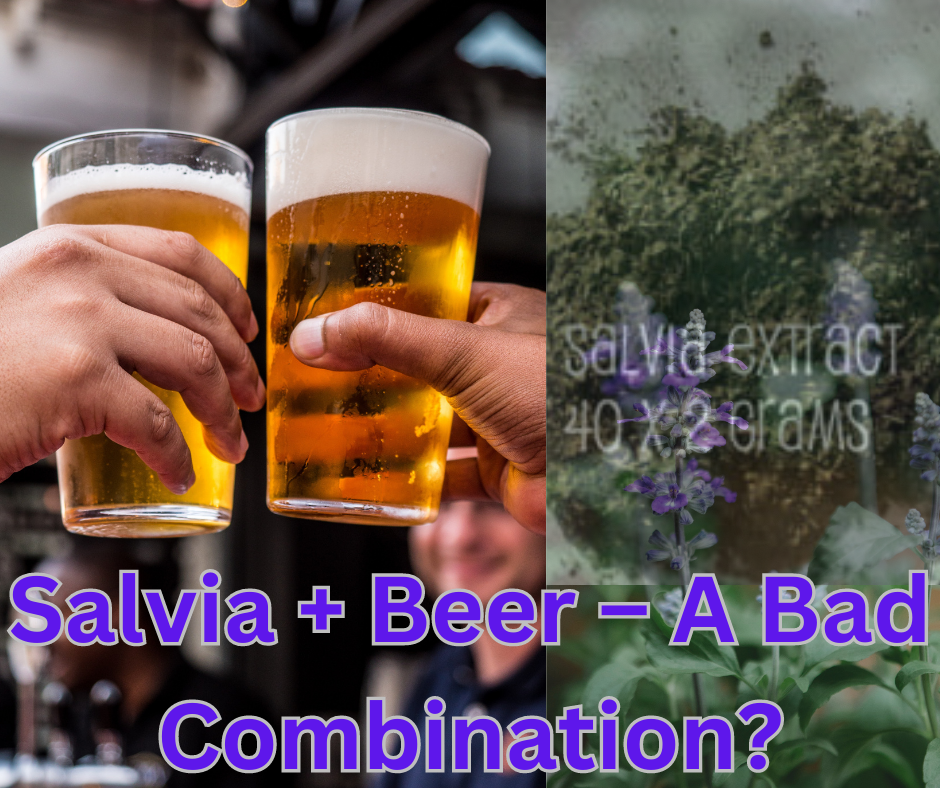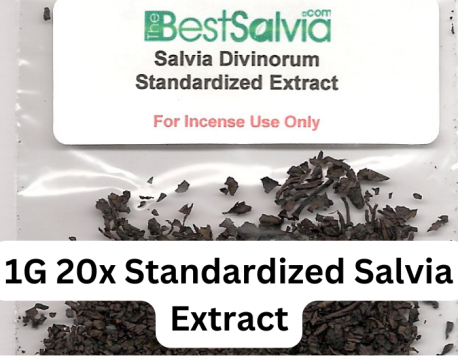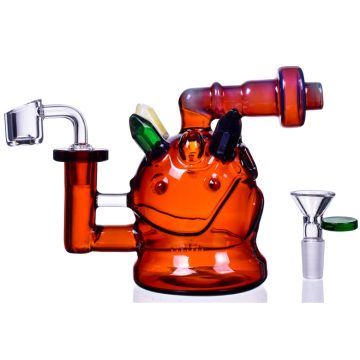Salvia and beer are two substances that have been known to interact in ways that can be dangerous. This article will explore the risks of taking salvia + beer and discuss why it is not a good idea.
We will also look at some potential use cases of salvia and beer and the potential risks associated with their use. By understanding the dangers of combining these two substances, we can make informed decisions about our health and safety.
This section will discuss different ways of taking salvia + beer, including proper dosage and understanding the herb’s effects. You will also learn about the many uses of salvia as a traditional medicine.
Understanding Salvia and How It Works First
What is salvia, and how does it work in the body? Salvia (or Divinorum) is a hallucinogenic plant when smoked, chewed, or brewed into tea. It is typically made from dried and crushed leaves, with the resulting extract being smoked or drunk. The effects of salvia can last for up to eight hours after ingestion.
Salvinorin-A is the main active compound in salvia, which has been shown to inhibit the reuptake of serotonin, dopamine, norepinephrine, and acetylcholine in the brain. It also shows other potential effects on GABA, glutamate, and substance P.
Some studies have shown that the salvinorin-A effect is similar to an NMDA antagonist (a drug that inhibits the receptor responsible for sending signals in the brain) and a 5HT2A agonist (a drug that enhances signals to a serotonin receptor). Salvia can cause hallucinations, delusions, and other psychedelic effects.
Advantages of Using Salvia + Beer
Salvia is a plant traditionally used by Native Americans in ceremonies. It can be used as an entheogen, or an agent of spiritual transformation, by either chewing on the leaves or drying them to inhale the smoke from burning them.
It has also been used since ancient times as a medical remedy for pain and as a treatment for depression and anxiety. The herb is also sometimes referred to as sage.
Salvia is a plant traditionally used by Native Americans in ceremonies. It can be used as an entheogen, or an agent of spiritual transformation, by either chewing on the leaves or drying them to inhale the smoke from burning them. It has also been used since ancient times as a medical remedy for pain and as a treatment for depression and anxiety.
How Long Does Salvia + Beer Effects Last
The effects of salvia can last for up to eight hours after ingestion. Salvinorin-A is the main active compound in salvia, which has been shown to inhibit the reuptake of serotonin, dopamine, norepinephrine, and acetylcholine in the brain. It also shows other potential effects on GABA, glutamate, and substance P.
Some studies have shown that the salvinorin-A effect is similar to an NMDA antagonist (a drug that inhibits the receptor responsible for sending signals in the brain) and a 5HT2A agonist (a drug that enhances signals in the brain) but with a different molecular structure.
Health Effects Associated With Salvinorin-A
Many reported side effects of salvinorin-A include increased heart rate, dry mouth, and dizziness. In addition to these reported side effects, reports have indicated that people have had negative experiences while under the influence of salvia. These negative experiences include anxiety, panic attacks, hallucinations, and psychosis.
Beer is often seen as a great accompaniment to salvia, a powerful psychoactive herb used for spiritual and medicinal purposes for centuries. The combination of beer and salvia can be quite potent, allowing users to experience enhanced sensations and an altered state of consciousness.
Benefits of Taking Salvia + Beer
Beer has many benefits when taking salvia, including providing a calming effect, helping to manage anxiety, and reducing the intensity of the experience. Additionally, beer can help reduce nausea associated with salvia while providing a pleasant taste.
By understanding why beer is good when taking salvia, users can make informed decisions about their experiences with this powerful herb.
It is often said that the bitterness of beer helps to neutralize the harsh taste of salvia. Salvia leaves are notoriously bitter and can cause nausea, while beer contains a wide variety of bitter-tasting compounds, including hops and tannins, that help to mitigate this side effect.
Additionally, it has been suggested that alcohol in beer can help reduce intense anxiety associated with salvia use. Beer can also have a calming effect on users who experience anxiety during their salvia experience.
Salvia + Beer Vs. Other Hard Drugs
Alcohol has also been shown to increase the effect of certain substances like cocaine and marijuana. This may be because the brain releases endogenous opioids when alcohol is consumed, and these opioids, in turn, cause pleasurable feelings, leading to increased drug-seeking behavior, which increases the pleasurable effects of the drugs.
It has also been suggested that alcohol causes dopamine release in two regions of the human brain—the ventral tegmental area and the nucleus accumbens—which can lead to increased feelings of pleasure from the use of cocaine.
Why Alcohol Has Hurt Society
There are several areas in society that alcohol consumption affects in multiple ways. First, there is a direct correlation between rates of alcohol consumption and rates of crime. Alcohol abuse is associated with increased rates of domestic violence, sexual assault, homicide, child abuse and neglect, road traffic accidents, and suicide.
In addition to these direct effects on society overall, it has been suggested that excessive drinking may increase susceptibility to various infectious diseases such as hepatitis C or HIV/AIDS and certain types of cancer.
Mental Health Problems From Mixing Alcohol With Hard Drugs
Second, excessive alcohol consumption increases the risk of mental health problems. Heavy drinkers are more likely to experience depression, anxiety, and general behavioral problems such as antisocial or criminal behavior. This can lead to substance abuse, other psychiatric disorders, and a decline in academic performance.
Third, alcohol has been linked with a higher risk of injury and violence-related accidents, including motor vehicle accidents, falls associated with drinking, and injuries from chronic heavy drinking. But again, salvia + beer is not a bad combination if taken in moderation.
Negative Effects of Taking Salvia With Beer
It was taking salvia while drunk is dangerous and can lead to serious health consequences. The effects of salvia are unpredictable, and combined with alcohol, the risks become even greater. Salvia is a powerful hallucinogenic drug linked to mental health issues, including anxiety, depression, and psychosis.
When taken with alcohol, it can cause extreme disorientation and confusion. In addition to the potential physical risks associated with taking salvia while drunk, there is also the risk of addiction and other long-term mental health problems. Therefore, it is important to be aware of the dangers associated with this activity before engaging in it.
Salvia is a powerful herb that can intoxicate when consumed in large amounts. The same goes for salvia + beer. It is essential to know how to avoid getting drunk with salvia, as it can have serious consequences. This article will discuss how to avoid getting drunk with salvia, including proper dosage and understanding the herb’s effects. You will also learn about the potential risks of consuming too much salvia and how to recognize signs of intoxication.
By understanding these tips, you can ensure that you use salvia responsibly and avoid any unwanted effects.
Understanding The Relationship Between Sages and Alcohol
What is Sage? Salvia divinorum is a Mexican plant that serves as a hallucinogenic. The leaves and flowers of this plant contain salvinorin A, which aids in the intoxication process.
Salvia has been used for centuries throughout Mexico by shamans and medicine men who use it to enter trance states to connect with their spiritual guides and find insights into the world around them.
Related Article: Safer Ways to Use Cannabis You Didn’t Know Existed
Why Salvia Cannot Compare With Other Hard Drugs
[1]. People have recently started using it recreationally for recreational purposes, such as letting go of anxiety and insomnia. , and for enhancing trance states
[2]. Salvia is unique because it contains a psychoactive alkaloid, salvinorin A, which can get into the brain through the lining of the mouth. Salvinorin A is then broken down into smaller molecules in the liver and brain, with most of it being excreted. Only a small amount is stored in fat cells [3]. This means that tolerance builds up very slowly to salvia’s effects. Salvia leaves can also be eaten raw or dried and smoked as they are not psychoactive
[4].Salvia is a popular herb used for centuries to add flavor to dishes. But did you know that it pairs perfectly with wine? This article will discuss why you should accompany salvia with wine and the benefits of doing so. Salvia has a unique flavor profile that can be enhanced with the right wine type, unlike salvia + beer.
Salvia and Wine: The Best Combination
Combining salvia and a full-bodied red or white can bring out the herb’s subtle notes and add complexity to your dish. Not only does this create a more flavorful meal, but it also adds an extra layer of sophistication to your dining experience.
Additionally, pairing salvia and wine can help bring out the best in both ingredients, making for an unforgettable meal! Salvia is a popular herb used for centuries to add flavor to dishes. But did you know that it pairs perfectly with wine? This article will discuss why you should accompany salvia with wine and the benefits of doing so.
Salvia has a unique flavor profile can be enhanced with the right wine type. Combining salvia and a full-bodied red or white can bring out the herb’s subtle notes and add complexity to your dish.
Flavoring Salvia With Wine
A combination of salvia with wine creates a more flavorful meal. It adds an extra layer of sophistication to your dining experience—additionally, the herb pairs well with red meats, such as beef, lamb, and pork. White wines have not been shown to improve the flavor of salvia when cooked.
However, white wines are the first choice when pairing with this herb. This is because white wines have more subtle flavors than red wines, and they balance the strong flavor of salvia without overpowering its taste.
According to Wine Folly, some of the best wines to pair with this herb are those that are crisp, dry, and have an aromatic finish, such as sauvignon blanc, Gewürztraminer, and Viognier.
CoffeeSalvia is also a great herb to use when you’re making coffee. It can be used in your traditional morning cup of joe, or it can also be used in espresso drinks and iced coffees.
Apart from being added to the hot beverage, it can also be infused into cold brew coffee left overnight. For your morning cup of joe: steep the leaves in hot water for 20 minutes before adding them to your coffee grounds for a subtle hint of sage.
Must Read: Psychedelic Realms: Salvia Divinorum Will Take You There
Mint
The Queen of Herbs is also a great choice for your morning cup of joe. It’s refreshing, not overly sweet, and will make you feel less sleepy in the morning.
Infuse the leaves into cold brew coffee left overnight, or add a few sprigs to your hot beverage. The mint flavor is refreshing and wakes up the senses in taste.
Overall
For those who might feel anxious or uncomfortable taking large doses of this herb, drinking a few beers before trying salvia could be a good idea. As a result, salvia + beer could have sedative and anxiolytic effects on someone who wishes to smoke or ingest it. A moderate amount of beer is also perfect for a salvia setting. Don’t forget to go through our website for the best-standardized salvia extract.



